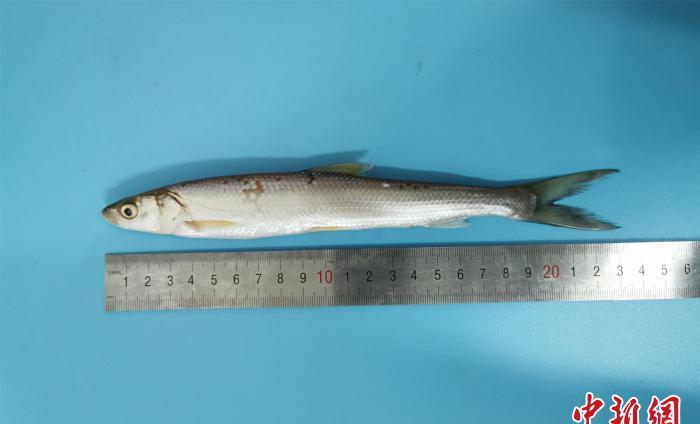
A few days ago, the Jiangxi Provincial Fishery Science Research Institute conducted aquatic biological resources monitoring in the waters of Duchang Songmen Mountain in Poyang Lake, and found a heel with a length of 23 cm and a weight of 47.4 grams. Photo courtesy of the Jiangxi Provincial Department of Agriculture and Rural Affairs Prohibiting Fishing
Nanchang, April 2 (Reporter Wu Pengquan) Reporters learned from the Jiangxi Provincial Department of Agriculture and Rural Affairs On the 2nd that after nearly a decade, Poyang Lake, China's largest freshwater lake, has reproduced heli fish, and the population of this species is expected to gradually recover.
Helio, commonly known as Diao Zi and Wheat Straw Diao, was once widely distributed in the Yangtze River and the rivers and lakes south of China. Its body is rounded and slender, the head is relatively pointed, and the largest individual can reach more than 10 kg. Because of its delicious meat, helios were once one of the important economic fish in the Yangtze River Basin.
According to the relevant person in charge of the Department of Agriculture and Rural Affairs of Jiangxi Province, there were originally many hens in Poyang Lake, and it liked to go to the Yangtze River and belonged to the migratory fish of the river and lake. However, due to engineering, water quality, overfishing and other reasons, the population has dropped significantly, and only one tail was found in 2012, and poyang Lake has not seen hemorring for nearly a decade.
A few days ago, the Jiangxi Provincial Fisheries Science Research Institute conducted aquatic biological resources monitoring in the waters of Duchang Songmen Mountain in Poyang Lake, and found a hemorrhoid with a length of 23 cm and a weight of 47.4 grams, filling the sample gap of the fish. Photo courtesy of the Jiangxi Provincial Department of Agriculture and Rural Affairs Prohibiting Fishing
Affected by water conservancy development and environmental pollution, the resource decline of heli fish is extremely serious, and the population is almost endangered, making it difficult to obtain samples. Given that heels have not been monitored for many years in many sections of the river, the protection level of heels has been raised to critical endangerment in the Red List of Vertebrates of China, revised in 2016.
Recently, the Jiangxi Provincial Fishery Science Research Institute conducted aquatic biological resources monitoring in the waters of Duchang Songmen Mountain in Poyang Lake, and found a 23 cm long and 47.4 g helio, filling the sample gap of the fish and enriching the aquatic biodiversity index of Jiangxi Province.
"The reappearance of the helio in Poyang Lake is equivalent to the return of this species, and the population is expected to gradually recover." This also means that the water quality of Poyang Lake has improved and the habitat environment has gradually improved. The above-mentioned relevant person in charge said that although the fishing intensity of the entire Poyang Lake is almost zero, compared with the history of 136 species, the population of helimps still needs a long way to recover. (End)
Source: China News Network